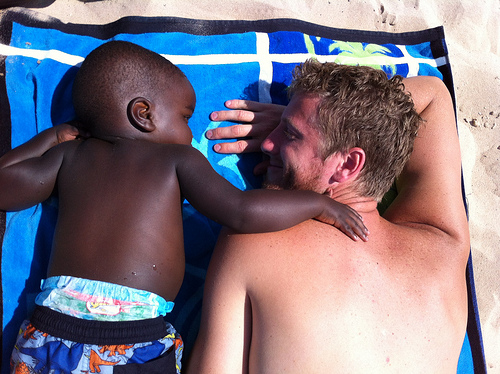 Earlier this year, Tell Me More, a wonderful radio show on NPR, broadcast a panel discussion including three dads who are raising children that don’t look like them. The insightful panel was hosted by Michel Martin. The conversation covers how the fathers deal with reactions from strangers, questions about how to raise their children with a racial awareness, and the blessing of raising transracial children.
Earlier this year, Tell Me More, a wonderful radio show on NPR, broadcast a panel discussion including three dads who are raising children that don’t look like them. The insightful panel was hosted by Michel Martin. The conversation covers how the fathers deal with reactions from strangers, questions about how to raise their children with a racial awareness, and the blessing of raising transracial children.
The discussion was sparked by journalist Kurt Streeter’s column about raising his biological son. In Streeter’s case, he is biracial but has the physical appearance of being black. His biological son, however, came into the world with a fully caucasian appearance. The panel also includes two fathers who have adopted children of a different race. One father has adopted an African American child and a biracial child. The third father has adopted four children from China.
I love listening to Tell Me More because they focus on news stories and issues from a different point of view, one more concerned with the viewpoint of people of color. Because of this perspective of the show as a whole, the panelists appear to be more comfortable talking about the topic then they might otherwise be. The show is also a great way for parents of children of color to stay aware of the concerns of the community.
One theme in the show is a theme we constantly address with our adopting parents at MLJ. The theme is all three fathers experience feeling more conspicuous as a family. One father explains the difference by describing the family’s experience at home, and then describing the family’s experience outside in public. Another father shares a story about when he was having difficulty getting his four-year old daughter in the car, and a caucasian onlooker approached him and asked what was going on. One father admitted to enjoying the opportunity to talk about race that parenting his child created.
Another issue MLJ strives to address in our education classes is the issue of race. Each father displays an awareness that appropriate racial socialization needs to be part of their parenting routine, yet they admit it isn’t easy. They talk openly about balancing the need to prepare their child for racism, yet feeling anxious that the child will then assume all negative experiences are due to his or her race. Judy Miller, our transracial parenting expert, addresses this concern in her transracial parenting class.
In the end, each father affirms that raising his children is a unique and precious experience. They seem to feel that raising children who are or appear to be of a different race has increased their ability as parents. They each report they are more sensitive to diversity and social issues, increasing their awareness of race in America.
I think this show would be a great brief introduction to these concerns for any parent considering adopting internationally. You can listen to the panel here.
Photo used with permission.
For more information about MLJ Adoptions’ international adoption programs, please click here.
